Oleksandr Vodoviz, head of the CEO’s office at Metinvest Group, has highlighted the challenges Ukrainian industry faces with the imminent introduction of the European Union’s Carbon Border Adjustment Mechanism (CBAM). Speaking at a Kyiv conference titled “On the Path to Integration: Dialogue between Government and Business for Ukraine's European Union Membership,” Vodoviz addressed concerns over access to European funding and the need for a transparent carbon emissions trading system.
The conference, organized by the Kyiv School of Economics with support from the Office of the Deputy Prime Minister for European and Euro-Atlantic Integration and financial backing from Sweden, brought together Ukrainian government officials, EU representatives, business leaders, and international partners to discuss the opportunities and hurdles of EU integration. Vodoviz spoke on the panel “Industrial Transformation of Ukraine: How EU Integration Changes the Rules of the Game.”
Vodoviz stressed that for Europe, decarbonization is primarily a market-protection tool rather than an environmental initiative. Since 2024, the EU has adopted over ten regulatory acts on CBAM, which will come into force on January 1, 2026. The directives set limits on CO₂ emissions for various products and establish a tax on exports exceeding those levels.
“With only two months left before CBAM kicks in, we still don’t know how much we will have to pay,” Vodoviz said.
He warned that research by Ernst & Young and the Federation of Employers of Ukraine predicts the CBAM could reduce Ukraine’s GDP by 5% starting next year, and by 10% by 2030.
“This is a serious blow to our economy. We must find a solution—either postpone implementation because we are at war, or negotiate alternative commitments to the EU to avoid the tax from January 1,” he added.
Vodoviz also noted that European metallurgical plants receive billions in grants to meet EU decarbonization and environmental standards.
“We don’t have those opportunities. That’s why we are asking for at least a five-year postponement of CBAM,” he said.
On carbon emission quotas, Vodoviz explained that EU companies pay €100–120 per tonne of CO₂, with some free quotas allocated to metallurgical and chemical enterprises. Ukraine has started monitoring and reporting greenhouse gas emissions, but the next step is establishing a functioning quota trading system.
“We are concerned about creating a fund where companies pay money and someone distributes it for decarbonization. We know where opaque schemes like this can lead. Instead, we advocate integrating with the European emissions trading system, where funds paid for emissions are returned to companies to support decarbonization,” Vodoviz said.





















